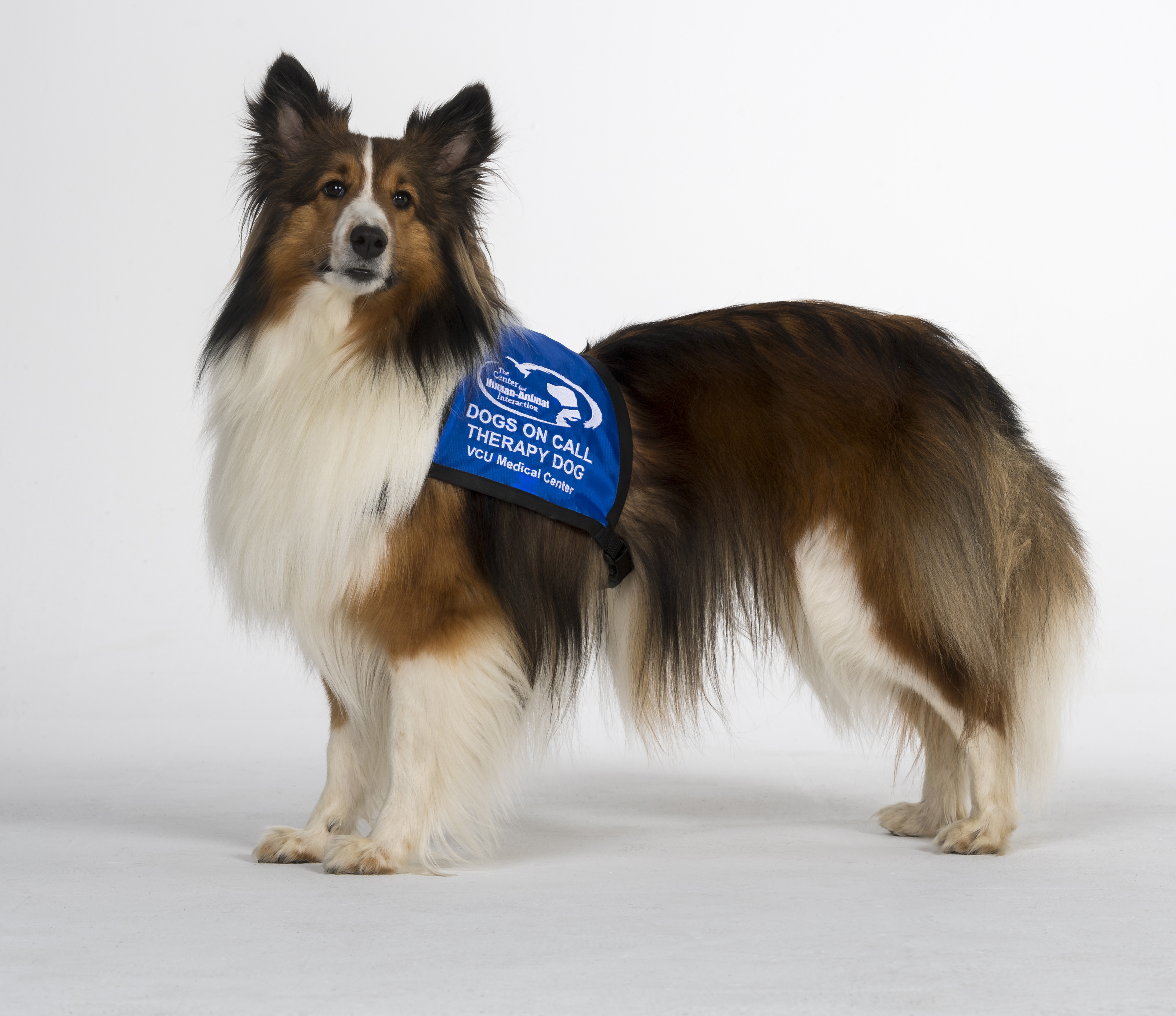Rounds with hounds
Medical students research and participate in dog therapy via VCU’s Center for Human-Animal Interaction

Indy—short for Dr. Indiana Bones—is a 3-year-old Sheltie in the Dogs on Call program. One of his handlers, Briton Spriggs, is a Class of 2023 medical student. (Photo by Allen Jones, VCU University Relations)
This story was published in the fall 2022 issue of 12th & Marshall. You can find the current and past issues online.
At VCU Health, there’s a volunteer-based, therapy dog visitation program that impacts an estimated 96,000 people in a typical year, and their research reaches millions.
That’s because their work helps confirm what many know to be true: Dogs are good for humans. “Research has shown physiological indicators of stress reduction, such as decreased cortisol, increases in oxytocin, decreases in blood pressure as a result of interacting with dogs,” says Nancy Gee, Ph.D., professor of psychiatry and the Bill Balaban Chair in Human-Animal Interaction. “A recent study showed decreased pain when dogs visited children in a hospital setting.”
Gee is the director of the Center for Human-Animal Interaction at VCU Health, which is unique among similar centers in that it’s housed within a medical school. Most are in veterinary schools. “This allows us to do a number of things that no one else can do, including rotations with medical students and psychiatry residents.”
The four-week, fourth-year rotation has students shadow Dogs on Call dog-handler teams and join research projects examining the impact of the program on patients.
Gee hopes that the students and residents walk away understanding not just the benefits of the program, but the scientific evidence supporting it.
“As future doctors, I want them to see how these animals can be deployed routinely, and safely, in medical situations,” she says. “There’s something quite magical about the Dogs on Call experience, and we’re capturing that magic with our research.”
Aspiring pediatrician Nadia Rentia had many memorable experiences during her third-year pediatric rotation. But some of the most notable ones involved visits from four-legged friends.
“The kids’ eyes would just light up when the dogs came around,” says the Class of 2023 student. “One pediatric patient was crying until the dog came and suddenly, he was laughing. It had an immediate impact.”
So when the opportunity arose to do a rotation with the Center for Human-Animal Interaction, Rentia jumped at the chance. She shadowed and assisted Dogs on Call teams in the hospital and worked on research projects with the center.
“I saw how much of a difference it made,” says the Northern Virginia native, who double majored in biology and math as an undergraduate at VCU. “It’s a unique treatment option for these kids, who are going through a lot of tough things.”
The intuition of the dogs is remarkable, Rentia says. “One pediatric patient in neurology couldn’t get up from bed because he had an EEG connected to him,” she says. “And the dog knew exactly how to get up and rest his head in a safe place.”
Rentia saw the dogs’ human handlers become like family to the patients, especially in the chemotherapy unit, where regular visits means they see the same dog repeatedly. And the dogs’ presence in the hospital brought joy to more than patients and families. “I love watching a doctor rushing by take a moment to pet the dog,” she says. “Everyone calms in their presence—staff, faculty, visitors.”
As part of her rotation with the center, Rentia helped Gee with a project evaluating how the handlers could be more involved in research. Rentia did a literature review of existing training in ethics, consent and the scientific process.
Rentia will take the lessons of her rotation into her future practice as a pediatrician. “Treatment is about more than diagnosis and medication,” she says. “Animals can be part of the solution.”
Eric Donley has spent plenty of hours in and around the MCV Campus—first in the paramedic program, and later via his work with the Henrico County Fire Department bringing him to the emergency department regularly. Now he sees the health system from the vantage point of a medical student on rotations.
But none of it, he says, is quite the same as wandering the halls of the hospital with a dog in tow. “Everyone wants to see you, and everyone wants to see the dog,” he says. “It shows the hospital in a different light—the tragedy some people are going through, but also the joy that an animal can bring.”
Georgia, an 8-year-old labrador, joins Donley for rounds via the Dogs on Call program, offering animal therapy to people receiving treatment. He says Georgia is a natural fit for the program. Labs like to work, for one.
“And Georgia is gentle. She’s smart,” says Donley, who will graduate in spring. “She understands when she needs to settle down and stay by someone’s side, or when she can wag her tail and really be a dog.”
Her favorite thing to do, though, is lay down on the floor at the nursing station, he adds. “She’s not a highly energetic dog. That’s her tempo—just laying there and being loved on.”
Donley plans to go into emergency medicine, and seeing the hospital through the lens of a therapy dog team has given him a unique perspective that he’ll take into his specialty. Georgia, he says, allows people to exist as people, not as a patient or the loved one of a patient. And she’s helped teach him to truly listen to patients and their families.
“Georgia lets them talk about whatever they want to talk about,” Donley says. “When I’m with her, I don’t have an objective or a task.”
He hopes to keep doing the program as much as he can and as much as his future residency allows. “It’s very special that VCU has this program,” Donley says. “All the dogs are amazing. They’re smarter than we give them credit for. It’s been very neat to witness that.”